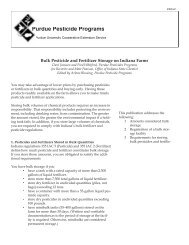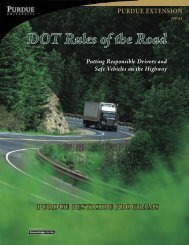Pesticides and Risk Communication PPP-52 - Purdue Pesticide ...
Pesticides and Risk Communication PPP-52 - Purdue Pesticide ...
Pesticides and Risk Communication PPP-52 - Purdue Pesticide ...
Create successful ePaper yourself
Turn your PDF publications into a flip-book with our unique Google optimized e-Paper software.
on the internet should be able to access only the positive or only the<br />
negative. We must jump on the internet b<strong>and</strong>wagon <strong>and</strong> post our<br />
message; <strong>and</strong> we must connect with every search engine available. We<br />
must STAND OUT <strong>and</strong> earn our own recognition.<br />
Conclusion<br />
Unquestionably, the use of pesticides has been <strong>and</strong> always will be<br />
controversial in our society. It involves very real <strong>and</strong> important trade-offs<br />
that concern people. Can one reasonably expect to educate the public<br />
amid so much background noise? And what about all the complications<br />
surrounding pesticide risk? Well, sometimes it is the noise that creates<br />
the interest . . . <strong>and</strong> people listen!<br />
Is it possible to educate the public on pesticide risk when the issues<br />
are couched as good news versus bad, or them versus us? Do people<br />
have the patience—or the interest—to listen to more of the facts? Will<br />
they tolerate descriptions of risk/benefit trade-offs instead of the either/<br />
or scenarios of advocates? Do people have the ability to underst<strong>and</strong><br />
science-based, reasoned explanation of the need for pesticides <strong>and</strong> the<br />
consequences of use, both good <strong>and</strong> bad? Will they listen with an open<br />
mind before making their own decisions? The answer is yes. The public<br />
will listen to a credible communicator who earns their respect; <strong>and</strong> the<br />
backbone of respect is knowledge <strong>and</strong> effective communication.<br />
Interest in risk communication is at an all-time high as government<br />
officials, industry representatives, scientists, <strong>and</strong> health <strong>and</strong> environmental<br />
safety advocates strive to communicate why the public should or<br />
should not worry about pesticide risk. Delivery of a clear <strong>and</strong> effective<br />
message through teaching, conversation, writing, or speech is a difficult<br />
proposition, even in the best of situations.<br />
It is difficult to get people to underst<strong>and</strong> <strong>and</strong> accept risk. It is also<br />
difficult to get those who ignore risk to acknowledge <strong>and</strong> respect it. As<br />
individuals, we base our beliefs on what we know; <strong>and</strong> what we know<br />
depends largely on our source of information. A person’s knowledge on<br />
pesticides, coupled with their own personal values, forms the basis for<br />
their stance on the issue.<br />
There are myriad views on pesticide risk. But people tend to key into<br />
concepts that complement their own agenda, that is, concepts that<br />
validate their own preconceptions.<br />
As risk communicators, our success in educating the public hinges<br />
largely on our skills in public relations. Instead of talking to an audience,<br />
we need to talk with them, to engage them in healthy dialogue. We must<br />
acknowledge <strong>and</strong> respect the audience’s point of view, even if it is<br />
unfounded or inappropriately skewed. We must afford the audience an<br />
opportunity to validate their concerns; <strong>and</strong> we must share our points of<br />
view <strong>and</strong> identify areas of agreement.<br />
48




